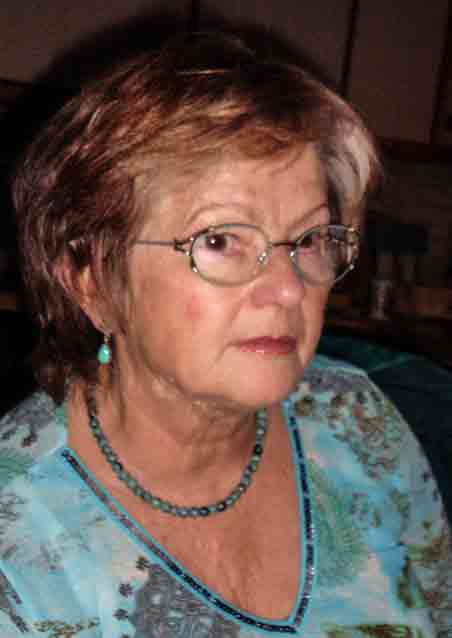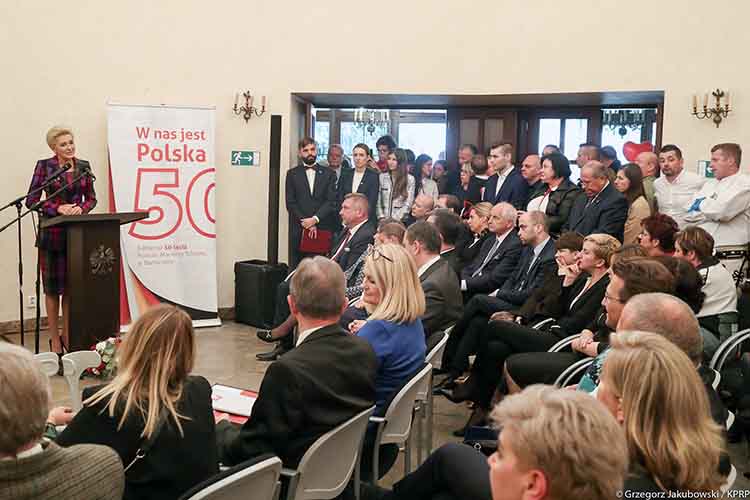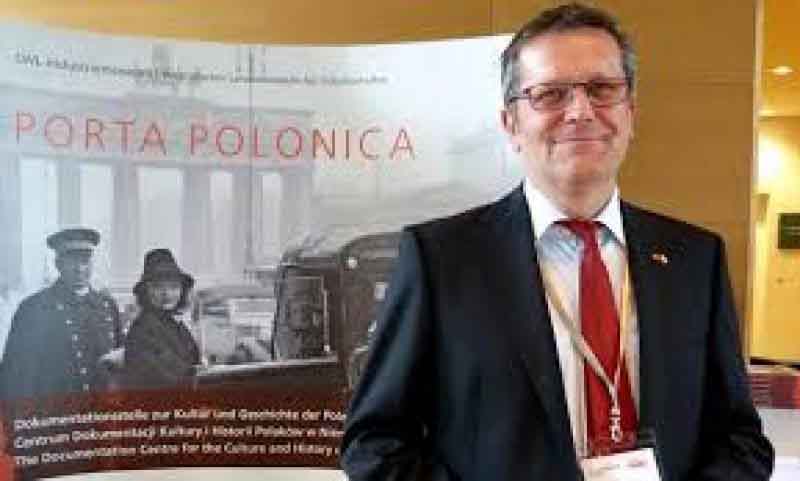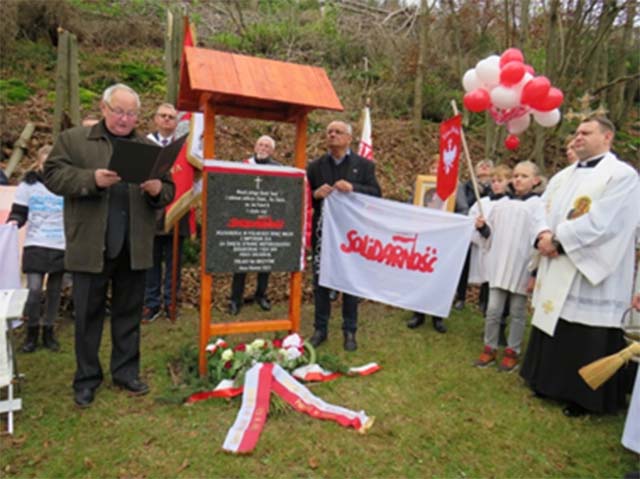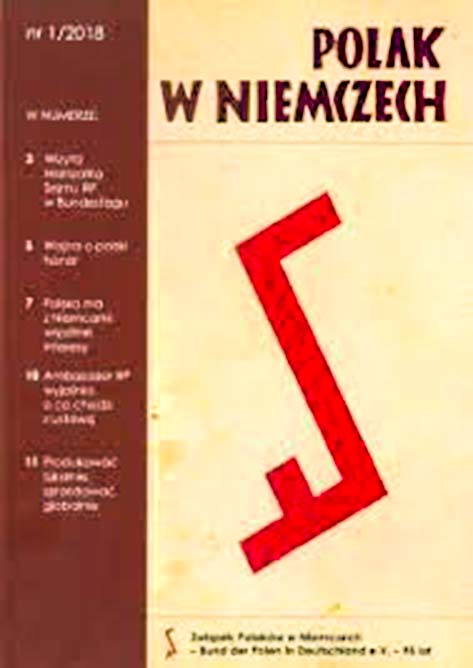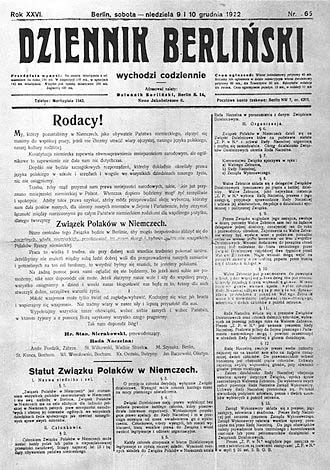On March 6, 1938, at the Congress of the Union of Poles in Germany (Związek Polaków w Niemczech, ZPwN) in Berlin, the ideological basis of the Union's activities was adopted, entitled "The Five Truths of Poles":
- We are Polish.
- The faith of our fathers is the faith of our children.
- A Pole is another Pole's brother.
- Every day, a Pole serves the nation.
- Poland is our mother. Thou shall not speak badly about the mother.
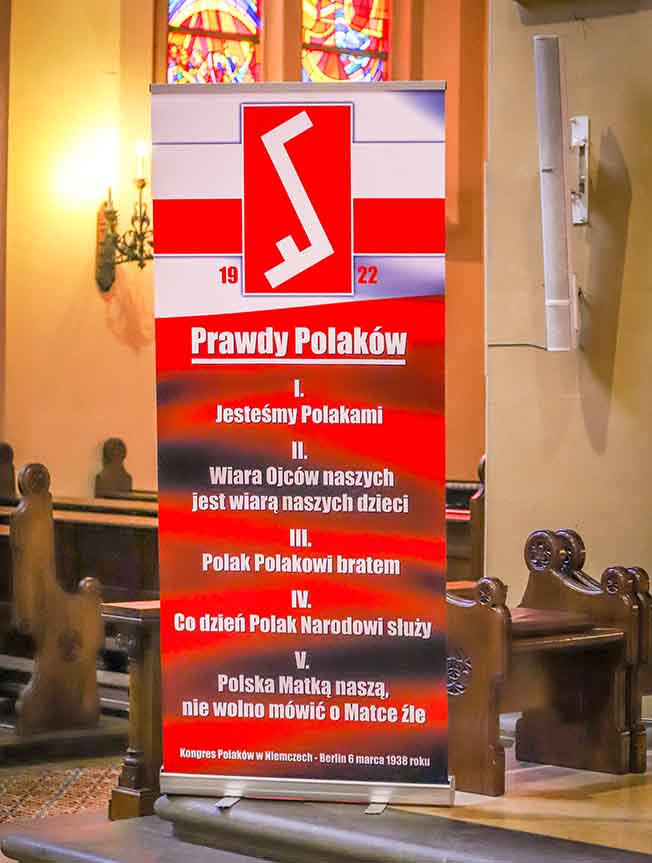
The five truths of Poles (Source: ZPwN)
On August 22, 2022, the Polish Sejm passed a resolution commemorating the hundredth anniversary of the establishment of the Union of Poles in Germany:
The Seym of the Republic of Poland pays tribute to the founders and former members of the Union of Poles in Germany and expresses its gratitude to the next generations who continue the activities of the Union and contribute to the protection of Polish identity.
The resolution was adopted almost unanimously.
Member of the Sejm, Mr. Janusz Kowalski (Solidarna Polska), said during the anniversary celebrations:
In matters of emigration, the Polish minority in Germany, in matters of Poles and Poland, we must all speak out loud together, we must speak with one voice, this is not a question of party affiliation, it is a matter for all of us.
He appealed to the media present at the meeting with an appeal to disseminate knowledge about the Union of Poles in Germany, its history and problems with which it is currently confronted.
The resolution passed in the Sejm on August 22 states that:
(...) many members of the Union paid for their activities with death and martyrdom. In February 1940, the Union was banned by the German authorities. Some of the activists were shot by the Germans, and several thousand were taken to concentration camps.
Exactly one hundred years after the creation of the representation of Polish nationality living in Germany, on Saturday, August 27, anniversary celebrations took place in Berlin. Over 120 people attended, from all over the world, from Poland, Germany, USA, and Ukraine. A group of children also came for a sporting competition.
The course of this celebration was very well prepared in terms of content, organization and visuals. The access was hindered by heavy rainfall and storms, which meant that on Friday evening, many late guests were still arriving at the four-star hotel "Maritim" next to the Brandenburg Gate, where the Union provided accommodation to the guests.
On that day, August 27, in the morning, all of us, politicians and Union members, went to the memorial site of victims of various nationalities, including Germans, murdered by the Nazis, 7 km away — to the Gedenkstätte Plötzensee-Charlottenburg cemetery, to honor Poles, members and ZPwN activists.
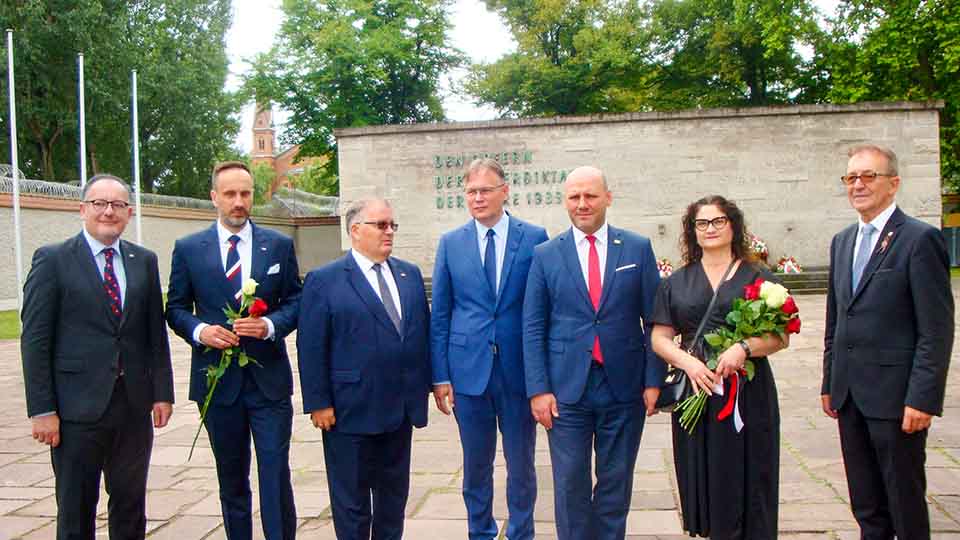
Tribute to the murdered Union members. From the left: Senator Ryszard Majer, MP Janusz Kowalski, Minister Arkadiusz Mularczyk, Minister Szymon Szynkowski aka Sek, Senator Dorota Arciszewska, President of the Union of Poles in Germany Jozef Malinowski (Photo: Maria Legięć)
From this place, full of reflection and a feeling of gratitude for the work begun by the Union of Poles in 1922 — the road led to the Polish Mass in the Basilica of St. John the Baptist on Lilienthalstraße in Berlin. It was a very solemn mass that corresponded to the content of the ceremony. It was celebrated by six clergymen, all of whom were Poles and supporters of the Union of Poles. The Rector of the Polish Catholic Mission in Germany, Fr. Dr. Michał Wilkosz presided.
Gospel according to St. Luke, talking about the need to nurture "talents" was matched to the day of this union meeting. Of the three servants who received talents from the Lord, only one, the last one, was rewarded because "he was faithful in many things." It was not difficult to read here an allusion to the effort undertaken by the Union of Poles in the development of Polish social thought, and to care for the right direction of the road to bring the Polish diaspora closer to God and the Homeland. The priest who delivered the sermon said:
Today we pray for the murdered activists and members of the Union of Poles in Germany, for Poles who died in World War II, for the deceased Polish Community activists and for Poles scattered all over the world.
One of the most important items on the program of the centenary celebrations was the football tournament announced by the organizers. In order to win the Cup of the Union of Poles, 400 young people came to the stadium, teams of children footballers up to the age of eleven from Poland, Germany, Slovakia, Hungary, Sweden, Ireland and Ukraine. Polish schools operating in Germany, such as Polonia United and "Polish Eagles" from Ireland, participated in the tournament. The tournament was started by President Jozef Malinowski, welcoming laughing, enthusiastic children in sports outfits. White and red balloons were launched skywards.
After the match, the most important moment of the celebration of the 100th anniversary of the Association took place at the Embassy of the Republic of Poland.
Everyone for whom Polishness is normal, and who cares about fighting for the rights of their compatriots living on German soil, came to this celebration of the 100th anniversary of the founding of the Union of Poles in Germany. These include the inviting Union members and guests, Ambassador Andrzej Przyłębski, President of the Constitutional Tribunal Julia Przyłębska, MP Janusz Kowalski (Solidarity Poland), Minister Szymon Szynkowski a.k.a. Sęk (PiS), MP Arkadiusz Mularczyk (PiS), Secretary of State in the President's Chancellery Andrzej Dera, the management of the "Polish Community" association, the President of the European Union of Polish Communities, Mr. Tadeusz Pilat, professor dr. Marek Rudnicki from Chicago, doctor Götz Frömming, a member of parliament from the German Bundestag, as well as representatives of the Union of Poles in Germany from various local and state divisions.
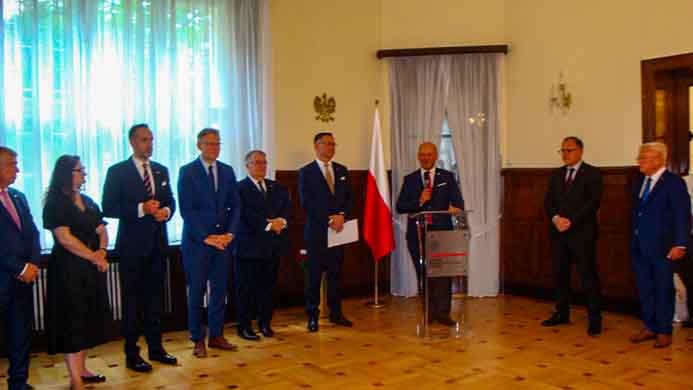
Members at the Polish Embassy in Berlin, from the left: Michal Jach, Dorota Arciszewska, Janusz Kowalski, Arkadiusz Mularczyk, Andrzej Dera, Pawel Gronow, Szymon Szynkowski a.k.a. Sęk, Ryszard Majer, Tadeusz Pilat (Photo: Maria Legieć
This meeting of Poland and the Polish community was started by the Ambassador, emphasizing the Union's merits in consolidating Polish tradition, national political thought and uniting Poles on German soil. The President of the Republic of Poland, Andrzej Duda, sent a congratulatory letter, read out by the Secretary of State in the Chancellery of the President, Andrzej Dera, in which he emphasized the importance of the organization's symbol - Rodło:
The Rodło replaced the Polish national emblem and colors banned by the Nazis. (...) It remains an important and revered sign, a symbol of the tenacity, self-sacrifice and courage of those Poles in Germany who wish to protect their national identity. (...) The establishment of the Union of Poles in Germany is one of the most important events in the history of Polish emigration. It was not only a symbolic, but also a practical expression of national pride, attachment to Polishness and the growing aspirations of the founders and members of this respectable association, living in an environment that was unfriendly to Poles, and in the 1930s and 1940s, even hostile and dangerous.
At the end of the letter, the President of the Republic of Poland expressed his greetings:
On the occasion of today's jubilee, I express my deep respect and appreciation to those who, acting in the ranks of the Union, supported their countrymen who did not want to renounce the speech, culture, tradition, faith and values of their ancestors. I wish you unflagging joy and pride in being a Pole, satisfaction with the results of your much-needed social work and all your personal well-being. I cordially greet you, your family and relatives and all my compatriots who have settled in Germany. All the best!
Minister Szymon Szynkowski, aka Sęk (Ministry of Foreign Affairs) also took the floor, conveying the greetings and thanks to the Union of Poles in Germany from Prime Minister Mateusz Morawiecki. He assured that the role of the Union of Poles in Germany would be "a very important point of reference" for the Polish government and the Ministry of Foreign Affairs. Minister Szynkowski emphasized:
You can count on the Polish Ministry of Foreign Affairs to take a principled position in difficult matters, to talk to the German side without avoiding honest words. Sometimes the German side does not have to like it, but we represent the Polish interest, we also represent the interest of you as Poles living in Germany.
The President of Law and Justice (PiS), Jarosław Kaczyński, also sent a letter to the participants of the celebrations, which was read out by Mr. Arkadiusz Mularczyk, MP. In it, we heard that:
August 27, 1922, the day the Union was established, will forever be a day memorable in the history of the development of Polishness in Germany. Because the awaited, preceded by the longing of all who had the national cause at heart, the Union of Poles in Germany has become a political fact.
The words of the leader of PiS Jarosław Kaczyński "Let the five truths of Poles under the sign of Rodło lead the union for the next hundred years" can be considered a signpost for the ZPwN, for its path to the future, currently not strewn with roses, for further ambitious, pro-Polish and intensified union work, for the whole of its effort.
After the speeches of representatives of political life and the Union's authorities, there was the moment of the ceremonial presentation of the Bene Merito medals, which have been awarded since 2009 by the Minister of Foreign Affairs for special services to dedicated ZPwN activists. The awards were presented by the Deputy Minister of Foreign Affairs Szymon Szynkowski, aka Sęk.
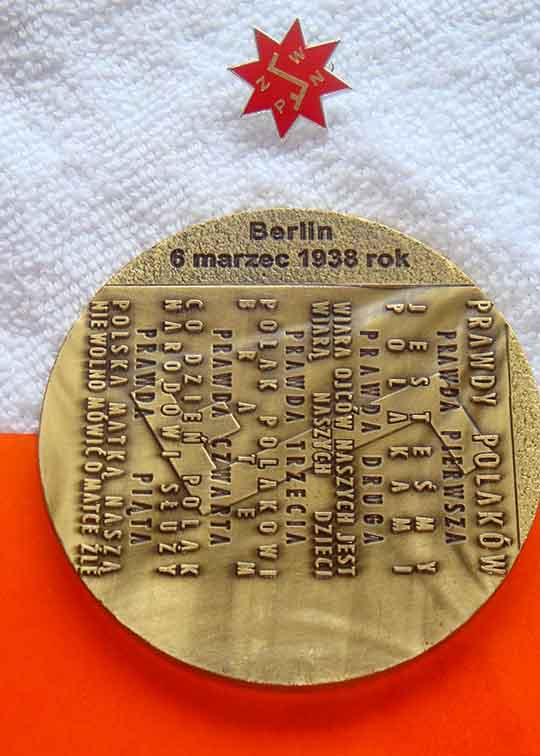
"We are Poles, so we have Polish obligations." Commemorative medal and plaque for the centenary of the Union of Poles in Germany. (Photo: Maria Legięć)
It can be hoped that the history, the recovery from the post-war stagnation, precise goals, systematization of tasks, and the beginning of the achievements of the Union of Poles in Germany, will inspire people everywhere and all those who speak and feel Polish.



